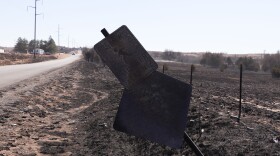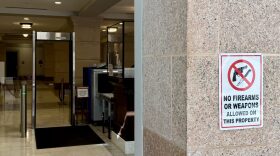Last week, the U.S. House passed a bill to halt a program that brings Syrian refugees to the United States. The vote came less than a week after the ISIS attack in Paris that left over one hundred people dead.
Oklahoma has a long history of taking in refugees. Notably, Vietnamese refugees settled in Oklahoma City in the mid-1970s. Now, many Burmese refugees of the ethnic Zomi minority are establishing themselves in both Oklahoma City and the Tulsa area.
Three Syrian refugees have settled in Jenks, Oklahoma. Some states have received many more Syrian refugees, while some states received none.
Two agencies place refugees in Oklahoma - Catholic Charities of Oklahoma City and Catholic Charities of Tulsa.
Catholic Charities of Oklahoma City executive director Patrick Raglow spoke to KGOU’s Jacob McCleland on Oklahoma Voices.
Interview Highlights
On the refugee process, and how it's evolved
It’s only been since 2011 or so since Syria was producing any refugees in significant numbers. And so for a refugee from any country to be admitted into the United States, it’s a very, very long process. First, the UN High Commissioner for Refugees identifies them as being a refugee. Then they are introduced for possible resettlement into the United States, after which the United States government Department of State, Department of Defense, National Counterterrorism Center - all these processes go in place to try and vet these individuals and it can take up to two years before any would come into the country. Prior to that, though, you could have family reunification. And in the case of Tulsa, there’s a gentlemen here and members of his family joined him. He’s been a member of the Tulsa community a number of years. He’s not unknown to the Tulsa community and that’s family reunification. That process started long again before this current conflict in Syria.
On the vetting process, and making sure refugees are not national security issues
Well first of all, I do not speak for the U.S. government. I do not profess to know all the pieces and parts of it. I can say that I know that even for those, say from Iraq and Afghanistan, who often bled and led with U.S. forces in the missions that we had in Iraq and Afghanistan, putting their own lives and the lives of their families at risk for their cooperation with the United States, even those people, well known to the Department of Defense or Department of State, even those persons took 18 months to two years to clear the process to come over and resettle in America because they entered this refugee pipeline process which is one of the hardest ways to actually get into the United States.
On who the Iraqis and Afghans refugees are who've helped U.S. armed forces on the battlefield
Yes, working in our embassy locations, working with the forces, doing duties in the camps and installations that the military had across both of those countries. So there are a number of clearance levels they took before they were allowed to work with forces and then had personal relationships with many of the military or State Department personnel that were in difficult situations over there. And again, even those folks, they took a very long time to screen and not all of them have yet made it through the pipeline and not all of them will to get into the United States.
On his thoughts on governors who have requested to not bring Syrian refugees into their states, and the pause in bringing Syrian refugees into the United States
Well first of all, it is a natural and understandable inclination to insure that our communities are safe. That’s the first order of government, and that’s the first order of our state government or our federal government. So that’s natural and should not be dismissed. The second thing I would say is that, precisely because the federal government believes the same thing, it has put in place these policies and procedures and refined them further after 9/11, refined them further in the years since, to insure that they’ve done as good a job as can be done to make sure that people coming into this country pose no harm to its citizens.
KGOU relies on voluntary contributions from readers and listeners to further its mission of public service to Oklahoma and beyond. To contribute to our efforts, make your donation online, or contact our Membership department.








